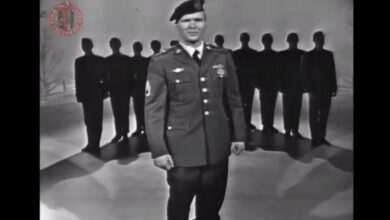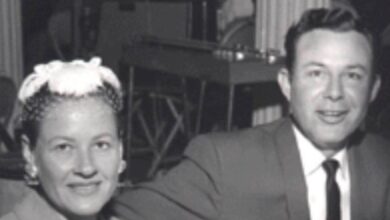Marty Robbins’ “I Walk Alone” in its most cherished version
Marty Robbins was more than just a singer; he was a storyteller whose narratives often blended the ruggedness of the American West with poignant reflections on love, loss, and the human experience. Born on September 26, 1925, in Glendale, Arizona, Robbins grew up in a time when the country-western culture was burgeoning. Coming from humble beginnings, his early exposure to music, influenced by the sounds of the Western radio stations, set the stage for his remarkable career. Robbins’ journey to fame began with his first hit in the early 1950s and continued to flourish through the decades, establishing him as one of the most prolific artists in country music history.
Robbins’ distinctive sound was deeply rooted in country traditions yet infused with modern sensibilities and various musical styles. His versatility stretched across genres, as he adapted elements from pop, rock, and even traditional Mexican music, creating albums that were diverse and appealing to a wide range of audiences. Songs like “El Paso,” which tells a haunting tale of love and violence, showcased his knack for storytelling, while others embraced the more lively, upbeat nature of honky-tonk music. Through his lyrical and musical diversity, Robbins effectively reached listeners from different backgrounds, making his music resonate across generations.
A significant highlight of Robbins’ career was his ability to evoke powerful emotions through his storytelling. Tracks like “I Walk Alone,” released in 1968, exemplify his talent for weaving personal narratives that resonate with the listener’s own experiences. This particular song reflects not only the struggles of artists on the road but also the universal feelings of loneliness and longing. Robbins’ lyrics encapsulate the emotional burdens we carry, articulating a timeless truth that strikes a chord with audiences of all walks of life.
The instrumentation in “I Walk Alone” further enhances its emotional depth. The interplay between the twang of the guitars and the melancholy of the fiddle complements Robbins’ rich baritone, creating a soundscape that feels both warm and bittersweet. The arrangement of the song is meticulously crafted, balancing rhythmic liveliness with poignant melodies that echo its themes of solitude and resilience. This duality in the music not only captures Robbins’ songwriting genius but also fosters a deep emotional connection with listeners, making them feel as if they are sharing in his journey.
In addition to his lyrical content and vocal prowess, Robbins was an accomplished guitarist. His skill on the instrument added further depth to his performances, allowing him to convey complex emotions through his music. Robbins often incorporated various musical influences he encountered during his touring years into his work, keeping his sound fresh and engaging throughout his career. This adaptability contributed significantly to the enduring appeal of his music, such as “I Walk Alone,” which continues to resonate with audiences new and old.
Robbins’ legacy is an integral part of the tapestry of American music, influencing countless artists across genres. In country music, in particular, he left a lasting mark, paving the way for future musicians to explore and define their artistic identities. A proud member of the Grand Ole Opry and a recipient of numerous awards, including Grammy accolades, Robbins had established his name as one that would be revered by fans and fellow musicians alike.
The songs of Marty Robbins endure, finding new audiences while illustrating the timeless quality of his work. “I Walk Alone” is still revisited today, proving to be a source of comfort and understanding for listeners who appreciate its exploration of human struggles. The emotional resonance of Robbins’ music speaks to themes such as love, regret, and perseverance—universal feelings that transcend time and place, appealing to the shared experiences of listeners from varying backgrounds.
For many, “I Walk Alone” serves as a reminder of life’s adversities and stands as a testament to the strength found in memories and past experiences. Robbins’ unique ability to convey the paradox of loneliness tinged with nostalgia underscores many of his songs, providing both a refuge and a reflection for listeners. This collective engagement with his work fosters a sense of community, allowing individuals to connect over shared sentiments and life stories.
As music continues to evolve, the influence of pioneers like Marty Robbins remains significant. They remind us of the deep emotional connections that can be forged through song, and of the power of storytelling in music. Robbins’ ability to paint vivid pictures with words and melodies ensures that new generations will discover and appreciate the beauty of his artistry. Through beloved tracks such as “I Walk Alone,” Robbins’ legacy as a master storyteller and emotional performer remains deeply entrenched in the annals of music history.
Marty Robbins’ life was also marked by his contributions beyond music. His passion for acting, particularly in Westerns, showcased his multifaceted talent and commitment to the culture he loved. This aspect of his career further solidified his status as an icon of American pop culture, bridging the worlds of music and film. His longstanding appeal is a testament to both his artistry and his ability to reach into the human experience, ensuring his stories continue to resonate deeply within the hearts of listeners.





